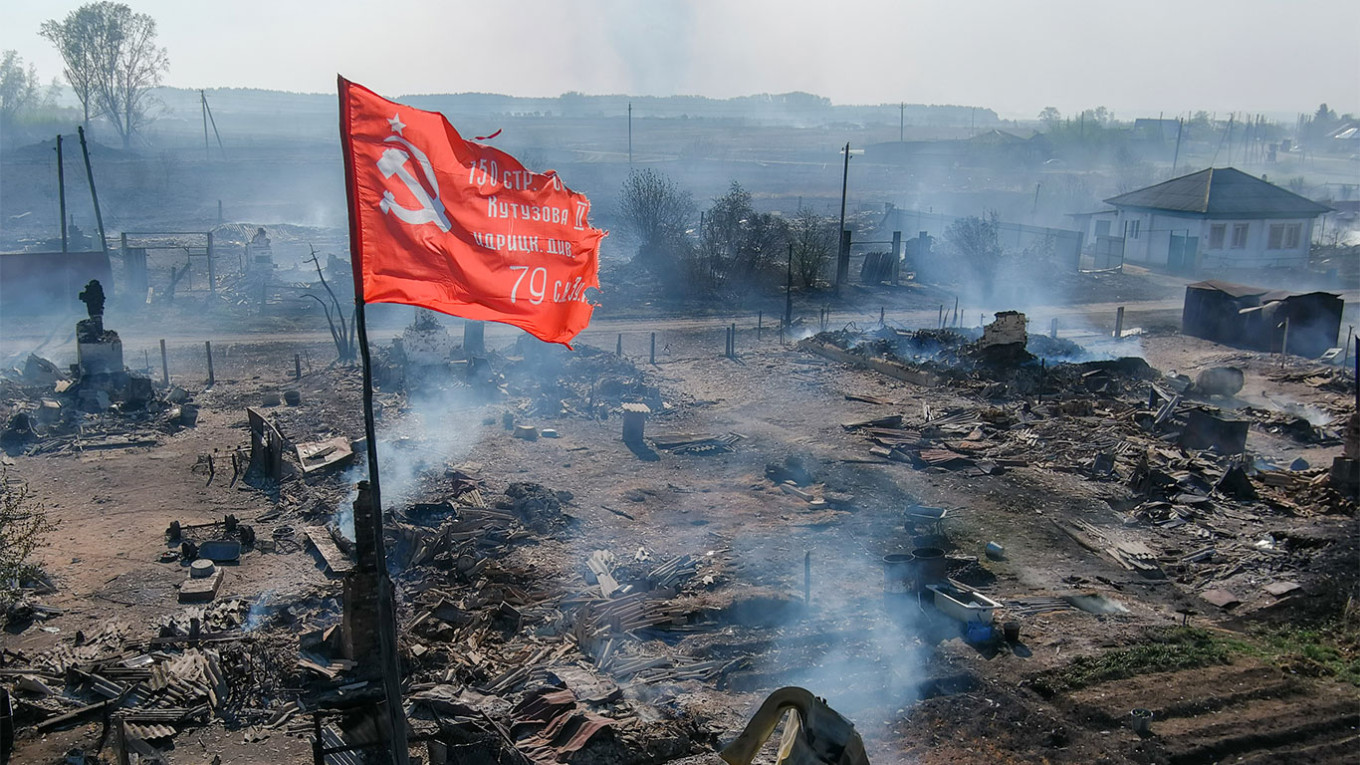Residents of Yuldus, a Tatar village in western Siberia destroyed by ongoing forest fires, have called on the head of Russia’s republic of Tatarstan to invest 500 million rubles ($6.5 million) into the area’s reconstruction.
“The republic won’t lose much [by allocating] half a million, but…we will know that Tatarstan hasn’t forgotten about us,” local resident Ruzan Khafizov said in a video appeal to Tatarstan’s leader Rustam Minnikhanov published Thursday.
“Thank you very much in advance, dear president,” Khafizov added, referring to Minnikhanov by the title that he was stripped of last year.
Yuldus, which is located in the Kurgan region some 100 kilometers northwest of the regional capital, was swept by deadly forest fires earlier this week.
At least seven of the village’s roughly 500 residents have been killed in the blaze, while 80% of its buildings were destroyed.
“Only one street with residential buildings remained untouched…The first-aid station also burned down,” Hafizov told the Tatar news outlet 116.ru.
Yuldus — also known by its Tatar name, Echken — is believed to have been founded by Tatar refugees who fled the territories of the Kazan Khanate after it was captured by Ivan the Terrible in 1552. Its population has remained largely homogenous ever since, with local Tatars preserving their language and cultural traditions.
“I have always called this Tatar village the capital of Tatars of the Kurgan region,” said Danis Shakirov, head of the executive committee of the World Congress of Tatars, a government-linked body supporting the Tatar diaspora worldwide.
The World Congress of Tatars was among several Tatar institutions that initiated aid and donation drives in light of the tragedy in Yuldus. The institution raised 2 million rubles ($25,970) and 20 tons of humanitarian aid in just a few days since its announcement.
“We have united. The entirety of the Tatar world got involved, not just the republic of Tatarstan,” Shakirov told The Moscow Times.
Most residents of Yuldus were initially relocated to a nearby village away from the fires. Once the first aid shipments reached Yuldus, a temporary shelter for the affected families was set up at a local school — one of the few buildings to have survived the blaze.
The government of the Kurgan region has promised a one-time payment of 50,000 rubles ($648) and a certificate covering the cost of new housing for individuals who lost their homes to the fire.
But according to Shakirov, most residents of Yuldus do not plan to move away from the village despite the fire’s devastating consequences, hoping instead to rebuild their generational homeland from scratch.
“The mood here differs: there are tears, but [there is] also hope that we will rebuild everything because everyone is with us, the entirety of Russia, the entirety of Tatarstan,” local Imam Ahmadullah Khabibullin told The Moscow Times.
The rebuilding works in the village are in full swing, according to Khabibullin, and the ground around destroyed houses has been leveled with a bulldozer in preparation for construction.
“People feel differently, but we are trying to convince them to stay here [in the village]. Most people want to reconstruct their houses here,” he said.
The World Congress of Tatars will on Sunday ship a second van with aid to Yuldus which will also contain lumber and building materials required to start reconstruction works.
But the efforts of the Congress, the Kurgan government and the federal government in Moscow might not be enough to support the ambitious village reconstruction plans, making Tatarstan’s help essential, according to Shakirov.
Kurgan region Governor Vadim Shumkov on Thursday confirmed that representatives from Tatarstan will arrive in the region next week for discussions about providing aid to those affected.
“Thank you, friends,” Shumkov wrote when announcing the Tatar delegation's planned arrival.
The head of Tatarstan’s press service did not respond to The Moscow Times’ request for comment.
It remains unclear whether the republic — which was recently stripped of the final remainder of its autonomy — will have the means or the political will to invest in its internal diaspora.
But active diaspora officials like Shakirov said they remained hopeful.
“This tragedy has once again shown that — when united — Tatars are a powerful force,” he said.
A Message from The Moscow Times:
Dear readers,
We are facing unprecedented challenges. Russia's Prosecutor General's Office has designated The Moscow Times as an "undesirable" organization, criminalizing our work and putting our staff at risk of prosecution. This follows our earlier unjust labeling as a "foreign agent."
These actions are direct attempts to silence independent journalism in Russia. The authorities claim our work "discredits the decisions of the Russian leadership." We see things differently: we strive to provide accurate, unbiased reporting on Russia.
We, the journalists of The Moscow Times, refuse to be silenced. But to continue our work, we need your help.
Your support, no matter how small, makes a world of difference. If you can, please support us monthly starting from just $2. It's quick to set up, and every contribution makes a significant impact.
By supporting The Moscow Times, you're defending open, independent journalism in the face of repression. Thank you for standing with us.
Remind me later.







